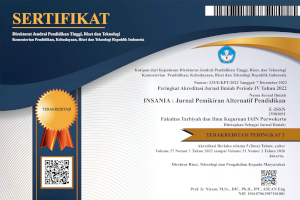Bimbingan Dan Konseling Di Madrasah Ibtidaiyyah (Paradigma Bimbingan Komprehensif dalam Bingkai Tematik-Integratif)
DOI:
https://doi.org/10.24090/insania.v18i2.1452Abstract
Abstract: The concept of integration in Madrasah Ibtidaiyyah (MI) not only between religion and science, but also inter-component management, teaching, and personal development. The goal is to produce graduates who are intelligent, faithful and devoted, and able to compete. However, problems of madrasa education in general and specifically MI is still confined to the graduates who are not scientists nor a scholar. Therefore, it is necessary to optimize the role of self-development component for students in basic education since or Madrasah Ibtidaiyyah. Model of self-development is the most appropriate approach to the development of integrative models-a comprehensive, unified meaning and guidance services are integrated with KBM to develop the potential of learners in a comprehensive manner. It is even stronger with the publication of the 2013 curriculum adopts a thematic-integrative. Referring to the basic strength of the curriculum in 2013 and the model with keterapaduan program guidance, energy, engineering and support system and its operation, the purpose of education to develop the whole person will be more easily achieved. Keywords: Guidance Counseling, Madrasah Ibtida’iyyah, Comprehensive.Downloads
Downloads
Published
How to Cite
Issue
Section
License
Authors who publish with this journal agree to the following terms:
Authors retain copyright and grant the journal right of first publication with the work simultaneously licensed under a Creative CommonsAttribution-ShareAlike License that allows others to share the work with an acknowledgment of the work's authorship and initial publication in this journal.
Authors are able to enter into separate, additional contractual arrangements for the non-exclusive distribution of the journal's published version of the work (e.g., post it to an institutional repository or publish it in a book), with an acknowledgment of its initial publication in this journal.
Authors are permitted and encouraged to post their work online (e.g., in institutional repositories or on their website) prior to and during the submission process, as it can lead to productive exchanges, as well as earlier and greater citation of published work (See The Effect of Open Access).








